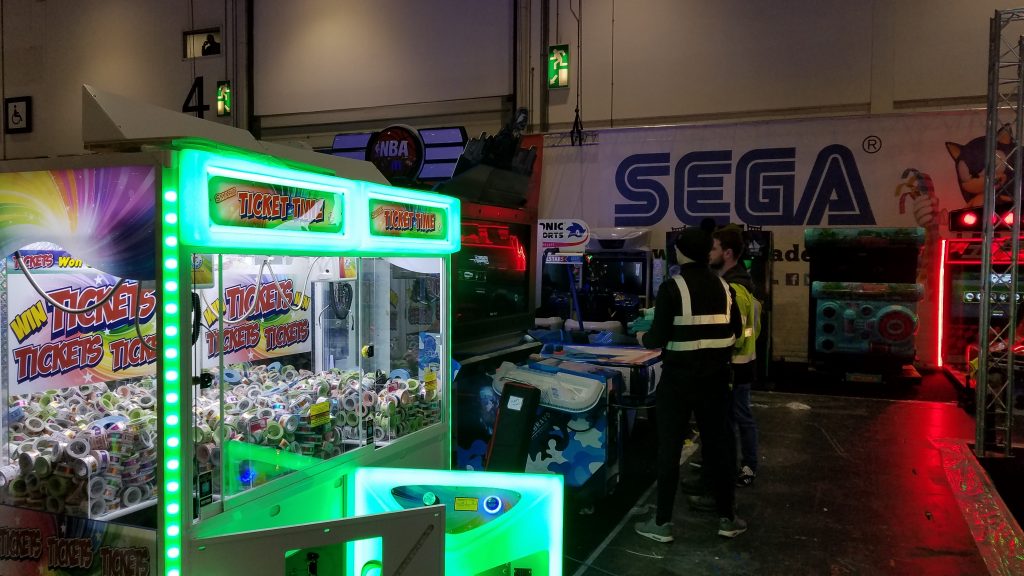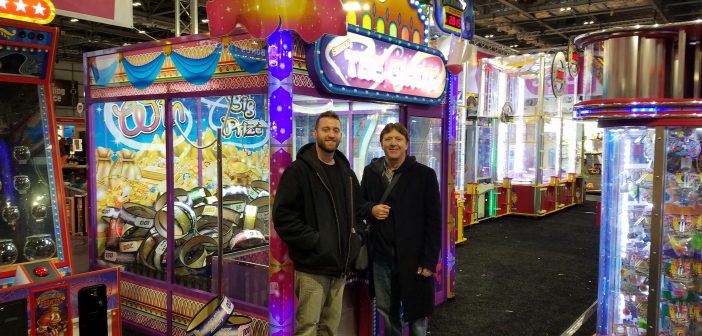Thinking “Smart” Pays Off
Smart Industries’ Toppers Talk Ticket Time, Giant Taj Mahal, the Fair Play Pledge and the Future for the Agile Company
In the 1960s, the late Gordon Smart founded a company that has helped transform the amusement and redemption landscape. Smart Industries, now headed by Gordon’s son Jeff, has been a mainstay in crane games since its inception, and today continues to revolutionize cranes with innovative ideas such as their most recent success, the Ticket Time crane.
This concept, which the firm proports to have popularized, adds a lucrative twist to the traditional idea of what you can win in a crane. With Ticket Time, operators can utilize tickets, bundled in rings or preformed to designate a certain amount as the prize, adding synergy to game rooms with redemption counters and a fun new way for players to save for a coveted prize.

Smart’s Ticket Time during setup at the Sega EAG booth.
“In 2016, Ticket Time was up and coming,” Smart Industries’ VP Jim Dupree said. “It has now proven to be one of the best games we’ve ever made. We’re getting reports of machines averaging $1,500 a week, I even had a guy call me saying his double Ticket Time made $7,000 in one week. We’ve gotten a lot of thanks for this one, and it feels good to sell something that rolls a lot of money out for a customer.”
The Des Moines, Iowa-based firm has had great success building an entire crane dedicated to tickets, and believes the concept is actually more complicated than simply throwing ticket bundles into old machines. Dupree first took note of the concept in 2007 while traveling through Europe, latching on to the idea and moving Smart Industries toward Ticket Time. Smart Industries collaborated with Clarence Mabe and S&M Amusements to design a crane around the concept, immediately seeing the benefit to adding features with tickets specifically in mind.
“The presentation was a major focus for us, we think it’s as good as it gets,” Dupree continued. “It looks like an exciting piece, something new and fun. We’ve seen a lot of operators and competitors just throwing rings of tickets into old machines now that the idea has become popular, but it just doesn’t earn the same.”
Smart Industries has expanded the ticket crane idea into some of their other machines. As an example, the firm’s massive Giant Taj Mahal can come equipped for giant ticket rings now. Beyond the flexibility that offers, Dupree thinks the company’s expanding line of ticket cranes has added to the name recognition and popularity of the concept in general. And he might be on to something: multiple YouTube videos (especially those from the popular arcade-going Plush Time Wins channel) show players joyously struggling to win the most tickets from Smart Industries’ machines, with some having upwards of three million views!
“We don’t always sit on top of the mountain,” Dupree said in reference to the firm’s recent success. “But when we do, we like to stay there for a bit.”
“This concept has worked well for us and our customers,” said Jeff. “But we have plenty of more exciting things to come. We’re at a high point right now, and that doesn’t always happen, but we feel quite humble about it and appreciate the constant support from our customer base and distributors.”
Most of those exciting things are still being kept on the downlow, but both Smart and Dupree hinted at big things to come at the Amusement Expo and the further-off IAAPA Expo.
“We’ll have some things this year that a lot of people should be surprised with,” said Dupree.
Jeff Smart said Ticket Time’s success has allowed the company to increase its operating space in the past 18 months, as well as add staff to accommodate growing demand. The company is in the midst of establishing distributor relationships in Australia and Europe for its Ticket Time and Giant line of cranes. As this article went to print, Jeff Smart was getting his games set up for exhibit at the annual EAG show in London.
Fair Play
Cranes, and redemption games in general, have been in a bit of an identity crisis, with torch-bearing, Internet-savvy customers speaking out (to an ever more attentive audience) against those in the industry who value the short-term gains of operating rigged or unfair games. Recent exposés on the subject have garnered millions of views, thousands of comments and led to an atmosphere of distrust among some in the general public.
In response to this, and in hopes of returning to a focus on the “amusement” part of this industry, the AAMA announced the formation of an industry-wide Fair Play Pledge last year. (The FPP requires any AAMA member to build, sell and operate games that allow a player a fair chance of winning with every game played. For manufacturers and operators alike, this new requirement, which goes into effect summertime of this year, could have major effects.) According to Dupree and Smart, the FPP shouldn’t change much at Smart Industries though.
“We’ve always been a company that develops around the market’s needs,” Dupree said. “Over the course of as many years as the industry has been here, there’s been a phrase that everyone uses –– and the good guys get: ‘Winners make players.’ The idea that every single game is rigged is just false, because if that were the case, no one would be playing anymore!”
Dupree conceded that some games, especially redemption games and merchandisers that dangle pricey prizes for high-cost vends, have strayed far from the concept of “fair” in the past years. He thinks those games have created havoc in the industry, but mostly are the result of a few bad apples.
Focus on the Future
Dupree hinted at a new game being developed by Smart Industries that, similar to a basketball game, could be considered full-skill gameplay, and more attractive to the street market. With all this talk of tickets, one might think the company has forgotten that other half of the industry. But both Smart and Dupree are eternally grateful and beholden to street operators that made the company what it is and continue providing a majority of its income and support.
“The street side of the industry has always been our main business. Sometimes we have a product going big in FECs, but it’s almost always been about 80 percent street and 20 percent FEC. That’s changed over the last few years, and we’re hoping that going into 2018 we’ll be even stronger in FECs,” said Smart, “but we never want to neglect our street customers.”
Smart hinted at a new piece designed specifically for street operators that the company would unveil at Amusement Expo. The agile, medium-sized company is constantly adapting, and Smart also said that there is a lot of internal chatter about how to best utilize emerging and dominant new technologies in their upcoming products.
“Everything is on the table when you’re talking about mobile tech and other new tech,” Smart said. “We look at this all the time, but these types of things take a lot of money and a lot of time to see how they pan out.”
Going forward, Smart Industries hopes to continue doing what they do best: innovating new games that make money and bring joy simultaneously, while also maintaining a family-oriented, responsive company.
“I consider us a medium-sized company,” Smart concluded. “We’re not anywhere near giant, despite what it says on our cranes, and we’re happy to keep it that way.”
Learn more about Smart Industries and its product line at www.smartind.com.




